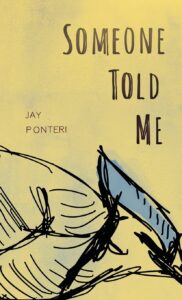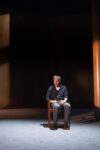
[Widow & Orphan House; 2021]
“Freedom is a discipline”
I.
The older I get (I’m 38) the more I realize how deeply my expectations serve to realize my reality. If I wake up in the morning thinking my lower back is going to hurt later in the day, my lower back is going to hurt later in the day. If I anticipate a thing — anything, be it a movie or song or restaurant — is going to either please or displease, said thing pleases or displeases me. Subconsciously or not, I actualize my value-sets all the time, which can be variously refreshing or depleting. For whatever reason, I perpetually root for the underdog, scoffing at the favored or favorite. I think a lot of books published by small presses are just as good as books published by bigger presses; marketing and breadth of scope are the only real differences. The shows I watch on Netflix are often foreign and, algorithmically at least, not at the top of the pile. (Or, in this instance, screen. You gotta refine the search and then scroll down. There’s a lot of wealth to be found.) If something has resoundingly good reviews across the board, I’m suspicious. Consensus is a word I don’t naturally cotton to.
Does all of this make me a snooty asshole? At times, yes, and it goes without saying that there are great things constantly being made that deserve the hype. (And attendant money and support that can play into that hype.) My own expectations can derail me — and yet I stand by them. The underdog mentality is one that at this point deeply pervades my sense of self. As a reader, then, the best works of literature for me have less to do with the actual language of the text and more to do with the lack of assumptions that I bring to them. This can be problematic, as sometimes (read: oftentimes) even the press that published a book will immediately impact what I think about that book, knowing absolutely nothing about the words inside. I’m judgey, in a word, simultaneously discerning and ignorant. I don’t think I’m alone in this.
II.
I came to Jay Ponteri’s book Someone Told Me with absolutely no expectations. I had never heard of the press that published it and had never read anything by Ponteri. (Although, being that he lives in Portland, OR, where I also live, I did know Ponteri a little bit — but as a human being, not as a writer.) This isn’t often the case with the things that I choose to read, and it was a refreshing occurrence. The older I get (again) the more I realize that I don’t want to know things — I want to find out about things. I want to indulge in curiosity for curiosity’s sake, but with so much out there constantly swirling around and around, this can be a hard thing to do.
While at Powell’s Bookstore in Portland I bought Someone Told Me on a whim, which is something I normally don’t do. More often I know what I want and why I want it. Having bought Ponteri’s book didn’t necessarily mean that I was going to read it, though, at least not immediately. (A bookseller friend tells me that over 95% of books purchased aren’t actually read, at least not cover to cover. I don’t know if this is true or not and, since the supposition depresses me, I’m not going to look it up. In my mind, this true-or-not “fact” holds staying power, however.) Although I try to get to all of them eventually, I have books purchased in 2016 that are still on my to-read pile. They albatross there, waiting silently. On certain days, the pile stresses me out. On other days, it excites me.
Someone Told Me went on the pile, same as all the others. One day not long after purchasing it, I picked it up. Short and fat (375 pages in total), the size of the book enticed me. I rifled through absently — consisting of long prose chunklets, with some chapters very long, others very short, the actual text seemed to be all over the place. Taken at random, sample text on page 71:
As Tom called me a skater faggot on the basketball court at Queen of Peace Church, Larry Levis boiled water for tea and turned up the radiator in his apartment before sitting down to work on ‘The Perfection of Solitude.’ Wallace Stevens walked to his job, composing lines for the poem ‘The Solitude of Cataracts’ as Mom, pretending to be a horse named Flicka, galloped through Grandma’s kitchen. Thinking his bullying would last indefinitely. My neck is sore.
I put the book down again. There was clearly a lot there, which was the point, but was there a place I really wanted to go? I had a million other things to read . . .
If Someone Told Me had been highly touted in the press, with laudatory reviews and blurbs and the works, I might have never picked the book up again. Which isn’t fair — but it’s also who I am. Since Ponteri’s text had arrived to me sans any real press or promo, however, I entered the book on its own terms, with no prior judgments rightly or wrongly imposed. I picked it up again.
Among many other things, Someone Told Me is a love letter to the author’s son Oscar. It’s also a treatise on masculinity (toxic and otherwise), a negotiating of Ponteri’s racial awakenings, and an ode to memory and liminality. It’s poetry and fiction and creative non-fiction all at once. (My copy of the book has a $14.95 US/ FICTION designation on the back cover, while above that blurber Jenny Boully categorizes the book as a volume of essays. I love that.) Someone Told Me is a commonplace book, with quotes and transcribed passages from a wide variety of thinkers, from Dionne Brand to Lacan to Leonard Michaels to Sarah Schulman. It’s a primer for contemporary living, a soliloquy unto the subjective thoughts and feelings of one protagonist who desires to be good and to do good — but the world and its myriad accoutrements sometimes get in the way of aspirational goodness.
For Ponteri’s “I,” though, it’s awareness that is most important. Better to glare into stark illumination than revel in the feel-goodness of let’s pretend. Midway through the text, one of the volume’s unnumbered chapters begins:
In 1999, moving to Portland, Oregon, a city that has dislocated its black community five times in the last 100 years.
Not knowing is often not caring to know.
. . .
Using cash from investments my parents had made for me years before, my former spouse and I purchased an 800-square foot bungalow in NE Portland neighborhood Woodlawn.
. . .
I have taken part in Portland’s most recent dislocation of the black community to which we refer as gentrification.
. . .
The problem that empathy is a white construction, the destructive white imagination making whiteness invisible, a move towards innocence (as described by Tuck, Yang in “Decolonization is not a metaphor”), this innocence false, an impossibility, something one believes in to convince oneself that one might feel the pain of another human, in this materializing context, the pain felt by communities of color, by black and brown bodies in particular, this illusion another distraction from reflecting upon the violent white imagination.
Here, Ponteri’s protagonist refuses to engage in any act of solace, especially vis-à-vis one’s implicated self. Change will hopefully come, but awareness can begin immediately.
Above all else, Someone Told Me is a winding, discursive trail that fully epitomizes Donald Barthelme’s well-known essay “Not-Knowing.” Ponteri rarely knows, but he always discovers. And the reader does so right alongside him. In a section of the book obliquely related to distant familial relations and brotherly companionship, we learn about the pejorative slur wop, one primarily used against people of Italian descent. Wop once meant “WithOut Passport” and as a result:
“He thinks this is his name, they have renamed him and his brother and all the other Southern Italians who came off the ship, WOP, they are WOPS, which will evolve into a derogatory term to remind Southern Italians and Sicilians of their lower caste till with each subsequent generation their olive skin fades, becoming more and more pale. White.” This passage is immediately followed by the sentences, “In the airport terminal I stand on a moving walkway no longer moving. Post-it Notes reminding me to do the grocery shopping or to pick up a ream of white paper at the Office Depot.” What we learn becomes us — and then, if we’re lucky, we move on.
In a later section of the book devoted to race and violence in Portland, Ponteri directly correlates “[t]he notion of pentimento, the underlayers of a drawing or a painting that are covered but still visible, felt, alive” with the fact that “America originates not from a need for ‘independence’ but because early colonizing enslavers wanted to sustain the slave economy in the face of growing resistance from England.” The logic is associational, which, to my mind, makes it all the more effective. What’s felt doesn’t necessarily have to be seen or heard because the shrouded implicit can compound and complicate far longer than the overtly explicit. Ponteri intuits this and writes accordingly in Someone Told Me: “I resist organized, manageable chunks of prose. In my work (not my life) I resist tidiness. I resist Monday Night Football and shopping at Costco and Walmart and house ownership and resort vacations.” The astute reader can see how the purposeful mess that is Someone Told Me benefits from this authorial unruliness. Ponteri’s book attests to the importance of living like an artist, day in, day out. For every acceptance, there is a rejection (or three) and life, in all its variegated splendor, goes on beside the work. Success comes through the actual writing, no matter where it ends up appearing. (Or doesn’t end up appearing.)
III.
If Someone Told Me had arrived in my life garlanded with accolades and endorsements from major writers, critics, or publications, it would have been a very different book for me. I likely wouldn’t have even read it. But because it sidled up slowly, barely announcing its presence, it impacted me deeply. No expectations, big rewards. (Tangentially, did I mention that my favorite song by The Rolling Stones is “No Expectations”?) My failure as a reader perhaps also represents my strength. I think the little books are sometimes big and vice-versa.
While reading Someone Told Me, I was also reading Jean-Paul Sartre’s essay “Writing for One’s Age.” In it he writes, “To write for one’s age is not to reflect it passively; it is to want to maintain it or change it, thus to go beyond it towards the future, and it is this effort to change it that places us most deeply within it . . .” Freedom is a discipline is something that I wrote in the margins of Sartre’s essay while reading. I’m not sure why; the phrase just seemed to announce itself. In Someone Told Me, Jay Ponteri writes toward change, with freedom being his primary literary device. It works. The book deserves all the expectations. Even more importantly, it deserves readers.
Jeff Alessandrelli is the author of the poetry collection Fur Not Light (2019), which The Kenyon Review called an “example of radical humility . . . its poems enact a quiet but persistent empathy in the world of creative writing.” Entitled Nothing of the Month Club, an expanded version of Fur Not Light was released in the United Kingdom in 2021. Recent work appears or is forthcoming in Fence, Gulf Coast, Chicago Review and Poetry London. Out on June 7th via [PANK], Alessandrelli’s latest book is the experimental novel And Yet. In addition to his writing Alessandrelli also directs the nonprofit book press/record label Fonograf Editions. He’s at https://jeffalessandrelli.net/.
This post may contain affiliate links.







